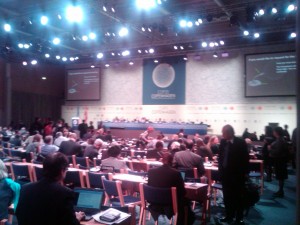Report from Copenhagen
More on:
I’m in Copenhagen this week at the UN climate negotiations. Topic number one for U.S. participants (aside from the mess outside) is the role that China and India are playing the talks. I’m particularly struck by the solidarity the two have displayed – which strikes me as a good deal for Beijing, but a dubious one for New Delhi.

In October, the two countries announced that they’d coordinate their strategies. Yesterday, they (together with Brazil and South Africa) held a joint press conference to make their common case. Faced with questions over their refusal to submit their emissions-cutting efforts to international verification – possibly the biggest sticking point right now in the talks – Jairam Ramesh, the top Indian negotiator, retorted: “Are you worried China and India will make up our figures?”
Therein lies the puzzle. The United States isn’t particularly worried about India; its democratic government and free press make misrepresentation unlikely. But it definitely worries about China, which is notorious for manipulating official statistics. (Beijing can get away with that precisely because it lacks transparency and accountability.) It would be a small step for India to submit its domestic monitoring efforts to international review, but it would be a big leap for China to do the same. But if India made the jump, China would come under far more pressure to follow. So long as India is making China’s case, though, calls for flexibility from Beijing will be much easier to resist.
So what does India get out of the arrangement that makes this all worthwhile? It’s not entirely clear. China isn’t about to isolate India by cutting a secret deal that commits developing countries to deep emissions cuts, so solidarity isn’t needed to protect India from pressure on that front. And India is by far the most vulnerable to climate change of the big developing countries – which means that if negotiations stall, it loses out in a big way. For New Delhi, the biggest reason for holding the line on verification is ideological: there’s a whiff of colonialism to having rich countries monitor poor ones, and India is naturally allergic.
But India is now a power in its own right. It is not being asked to submit to special monitoring as a developing country; it’s being asked to step up and be scrutinized just like the developed world. It is entirely consistent with India’s political system – indeed it would be exemplary of it – to extend its domestic transparency to the international level. So long as it refuses, though, it will give China an unnecessary and undeserved pass.
More on:
 Online Store
Online Store
